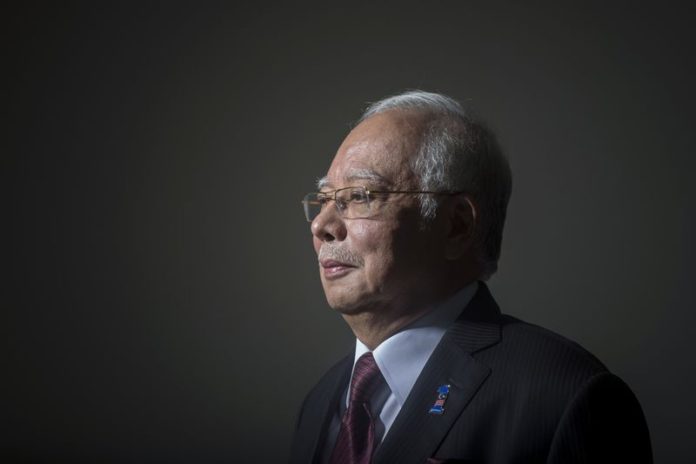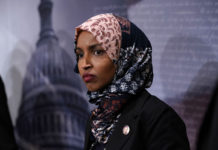- Prime minister gives first interview to foreign media in years
- Blasts opposition leader Mahathir, his former mentor
Five years after leading his party to its narrowest victory yet, Malaysia’s Prime Minister Najib Razak says he’s expecting a “better result” in an election that will pit him against his one-time mentor.
Najib, in his first interview with international media in more than three years, discussed the turbulent period which saw a scandal over a multi-billion dollar state investment fund spawn global probes. He now faces potentially his toughest fight in prolonging his coalition’s six decades in office, in an election that has become highly personal: A contest against the man who helped bring him to power in 2009, and a battle for the hearts of the country’s key voters, ethnic Malays.

Over the course of an hour in a room fringed with Malaysian flags at his party headquarters in Kuala Lumpur, Najib spoke about the May 9 election, the economy — promising more income and business tax cuts if he wins — the 1MDB fund furor and the question of his own political future.
Najib is seeking to preserve the unbroken rule by his United Malays National Organisation since independence in 1957. To cement his own position he may need to improve on his performance in 2013, when the UMNO-led Barisan Nasional coalition lost the popular vote for the first time while winning a slim majority of seats. One potential marker would be to regain the two-thirds majority in parliament that it ceded a decade ago.
“We are reasonably confident of a good result,” Najib, 64, said. “There is no movement for changing the government, I don’t see that. That’s not saying we will win with a huge majority, no I am not going to predict that, but I am going to say that we are reasonably sanguine about the result.”
Read more: Your Guide to Malaysia’s Election
Najib’s confidence is underscored by what he called “a motley collection of parties” that make up the opposition alliance Pakatan Harapan. The group is led by Mahathir Mohamad, 92, a former prime minister who has long championed the rights of Malays, while its biggest member — the Democratic Action Party — primarily appeals to ethnic Chinese Malaysians.
“I don’t see how they can work together,’’ Najib said.
Straddling the Malacca Strait, a key global route for seaborne trade and a gateway to the disputed South China Sea, Malaysia is a predominantly Muslim nation with an economy that is commodity-focused and can be vulnerable to swings in global oil demand. While Malaysia has sizable Chinese and Indian communities, ethnic Malays make up the bulk of voters — and they have long been the backbone of UMNO.
Since 2013, Najib has worked to shore up their support, especially in rural areas, and now needs them more than ever to fend off Mahathir, with whom he fell out in spectacular fashion over the 1MDB scandal.

Mahathir, who governed Malaysia for more than 20 years and famously pegged the nation’s currency during the Asian financial crisis in the late 1990s, broke with UMNO in 2016 and formed his own party, effectively coming out of retirement to challenge Najib. He’s also seeking to capture the Malay vote, a group Najib has courted by boosting cash handouts to farmers, civil servants and low-income workers.
The election is tinged with issues around race and religion. Chinese voters deserted Barisan Nasional in 2013, hardening the coalition’s focus on retaining Malay support….










